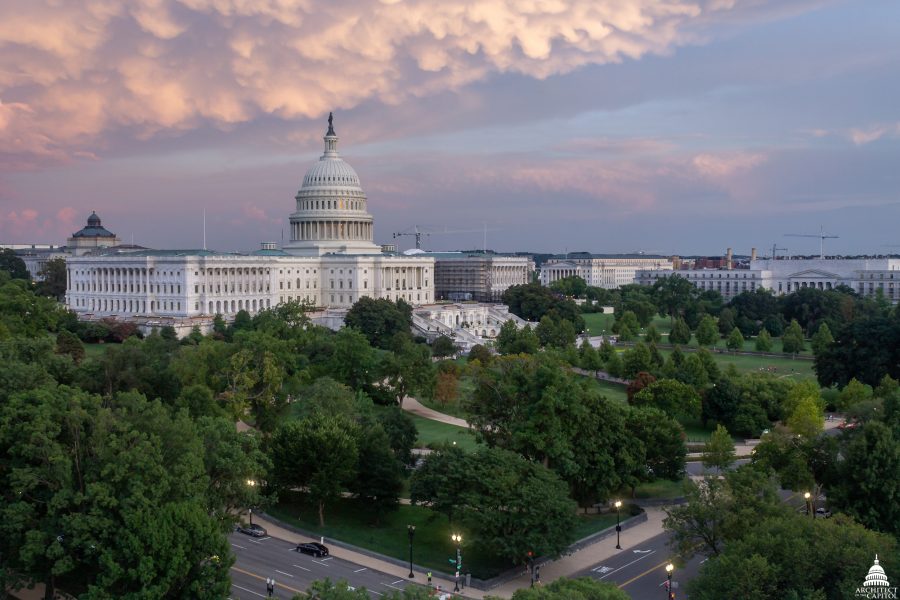Leaders of the House and Senate Armed Services Committees are tentatively scheduling a “Big Four” meeting for Oct. 26 to begin hashing out an agreement on the 2021 defense policy bill, House Armed Services Committee Chairman Rep. Adam Smith (D-Wash.) told reporters.
The Big Four refers to the top Democrats and Republicans on the two armed services panels: SASC Chairman Sen. Jim Inhofe (R-Okla.) and Ranking Member Sen. Jack Reed (D-R.I.), and HASC boss Smith and Ranking Member Rep. Mac Thornberry (R-Texas).
Lawmakers expect negotiations to be relatively smooth this year, despite some high-profile items, from language on U.S. troop levels in Germany and Afghanistan to a provision that would rename Army bases that currently honor Confederate figures. Both chambers passed their respective versions of the annual defense policy legislation in July.
Smith attributed the slow progress so far in part to Inhofe’s reelection campaign for a likely fifth Senate term. Reelection would start the chairman’s first full term in the top SASC post, after he took over following Arizona Republican Sen. John McCain’s death in 2018.
“We are in discussion, certainly, on the staff level. We haven’t moved forward as aggressively as I would have liked, in terms of having more ‘Big Four’ conversations,” Smith said on an Oct. 21 press call. “Sen. Inhofe has a campaign, he’s focused on that.”
Smith noted that leaving the bulk of those talks until after the Nov. 3 election is risky, possibly because certain provisions may fall prey to partisan politics based on the results. He did not answer written questions by press time about how the election might affect negotiations.
“We’re moving forward and the plan still is to get the bill done by the early part of December,” he said.
House Speaker Nancy Pelosi’s (D-Calif.) office, which appoints lawmakers to the conference committee, has not announced who will be party to those talks.
A congressional aide told Air Force Magazine in September that committee employees would focus on completing staff-level discussions by the end of the month. “We cannot discuss specific topics subject to the conference negotiations; staff is working on options for members to reconcile the differences in the House and Senate bills,” the aide said.
The final slate of funding authorizations still needs to match up with a compromise spending bill, which has stalled in the Senate, to take effect.
Smith remains optimistic that lawmakers will pass the 2021 National Defense Authorization Act by the end of December, three months after the new fiscal year began. He indicated that it’s plausible, but unlikely, that negotiations could stretch into January or later.
On that timeline, conference talks will wrap up shortly before President Donald J. Trump or former Vice President Joe Biden is inaugurated as President on Jan. 20, 2021.
Defense News recently reported that Smith and Reed, who would likely become the head of SASC if Democrats earn a majority in the Senate, have started discussing what the defense priorities of a unified Democratic government could be if Biden wins the White House.
“From what Vice President Biden has said, I think we are closely aligned on how much to spend on defense and the fact the nuclear enterprise is something we can probably spend less on, and still meet our needs, and thus free up money to do other things. I think there’ll be good synergy there,” Smith told Defense News.
While progressives push for as much as a 20 percent cut to the defense budget, Smith argues any spending overhaul must be justified by a revamped national security policy. He believes total defense spending could hover around $720 billion to $740 billion in the coming years—either flat funding or a slight cut.
The Trump Administration requested $740.5 billion for national security, including $705.4 billion for the Defense Department, in fiscal 2021.
“You will not hear me say that we need to cut the defense budget because the U.S. military is a malign actor in the world and must be constrained. I do not agree with that position,” Smith told reporters. “I do agree with the idea that we can have a national security policy that has a lower defense budget than we currently have. You’ve got to get there in a rational, responsible way.”
